DÉJÀ VU VS. NEVERMORE
A very prolific playwright, Steven Dietz can deliver dense dramatic homage. In his 2013 Mad Beat Hip & Gone, now playing at The Edge Theater Off Broadway, his dialogue dives into a recreation of beatnik Jack Kerouac’s road-trip fantasies. Another very recent work, his 2016 Bloomsday, incarnates and embodies James Joyce, specifically the stream-of-consciousness abandon of his still-controversial 1922 masterwork Ulysses.
Deliriously directed by J.R. Sullivan in a sometimes-captivating Chicago premiere by Remy Bumppo Theatre Company, these two hours evoke the non-linear, free-associative, rampaging wordplay of that often unreadable opus. It also has a lot to say about young love and late remorse.
Essentially a gigantic Dublin pub crawl, “Bloomsday” is an annual celebration of June 16, 1904, the pivotal date in the sprawling epic in which Leopold Bloom, trying to escape his toxic adoration of Molly, treks through the capital in search of salvation and/or whiskey.
Dabbling in the reliable magic of life imitating art, Dietz transforms a certain June 16th into a time-sensitive ground zero for a young couple who get seen from all sides. Crucially, their abortive affair will come to stalk their older selves. To show this persistence of memory, Dietz delivers a lot of bittersweet byplay between and among the young would-be lovers and their elderly surrogates. “What might have been” and “what really happened” fight it out as past and present interpenetrate.
Robbie (Jack DeCesare) is a young American tourist from Renton, Washington who fatefully meets “Bloomsday” tour guide Cathleen (Bryce Gangel). As she narrates Joyce’s “stations of the cross” (the surviving Dublin landmarks visited by the peripatetic Leopold Bloom), he falls hard for this lovely lassie, becoming, through attrition, by the end of the walking tour her only customer and instant devotee.
It’s agonizing to watch as they come perilously close to changing each other’s lives forever. But any straightforward chronicle of an impromptu date (without a sequel) would be very un-Joyce-like. Yes, Dietz chronicles that burning memory in the somewhat anticlimactic second act — but the first act intermingles Cathleen and Robbie with Cait (Annabel Armour) and Robert (Shawn Douglass), their selves from 35 years later. Entering the young people’s present, these mysterious emissaries from the future struggle, like Ebenezer Scrooge painfully observing Young Scrooge, to alter an outcome they know so well.
They’re not exactly time travelers, Cait and Robert, but they know intimate things about these newly met young folks that astonish and perplex Cathleen and Robbie. It’s Dietz’s way to show how “time is a chord.” For him, “Many notes, past-present-future, [are] all real’¦all alive…all played at once.” Much like Emily Webb, returned from the dead in Our Town to witness her 12th birthday, these elder versions are helpless to intervene, to escape mistakes innocently perpetrated by a too-analytical boy and an overly wary girl.
Dietz, who calls Bloomsday the story of a man “who is trying to go to a city but instead he goes to a time,” is probing how a seemingly transient incident gets embalmed in time’s amber. In effect the future beings who experienced it become their own ghosts. The romantic retrospective imagined by Cait and Robert, torn between what was never to be and what might have been, becomes as real as anything that happens on June 16th. It’s the ultimate compliment from Dietz to Joyce to conflate Bloom’s passionate promenade with a like-minded liaison generations later.
There are no “do overs” here but then, as Freud said, an unfinished task is never forgotten. An exhilarating unrest fuels the rhapsodies that convulse Bloomsday. But it also remains a rather precious play crammed with sometimes pat poetry and smug “Monday morning quarterbacking.”
It’s ultimately redeemed by the bedrock sincerity of four performances. Sullivan inspires the best from the best. Armour’s whimsical and elegiac spinster lady Cait, Douglass’s no longer cautionary “cold” English teacher Robert, DeCesare’s overly reflective “ancestor” to his later self, and Gangel’s brainy colleen — these are marvelous creations. Their aching ambivalence about committing to strangers or revisiting a lost love carry some richly convoluted emotion. This brief encounter that Dietz almost details to death can nonetheless haunt an audience as well.
photos by Michael Courier
Bloomsday
Remy Bumppo Theatre Company
Theater Wit, 1229 W. Belmont Ave.
Thurs-Sat at 7:30; Sun at 2:30 (check for add’l performances)
ends on June 22, 2019
for tickets, call 773.975.8150 or visit Remy Bumppo
for more shows, visit Theatre in Chicago
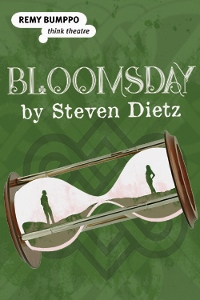
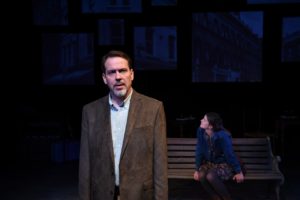
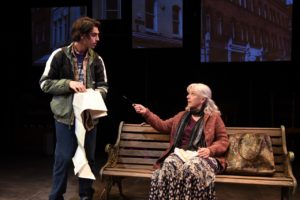
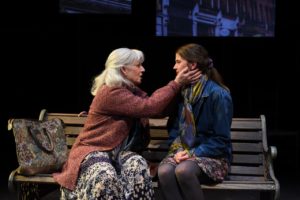
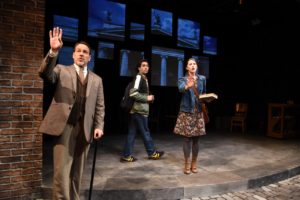
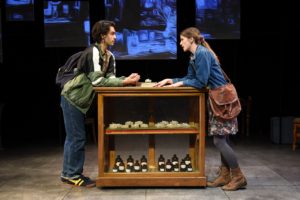
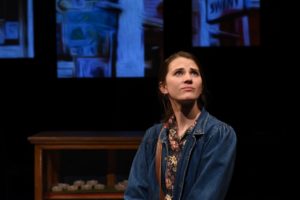
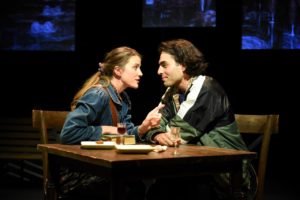
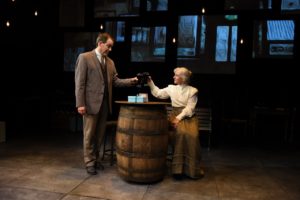
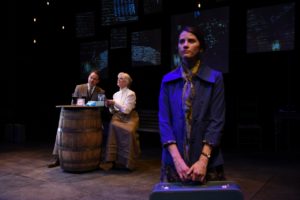

{ 2 comments… read them below or add one }
Any senior citizen discounts? We love the theatre but cannot do the $47 plus fee. Thanks.
Simply contact the theater box office at the number listed above.